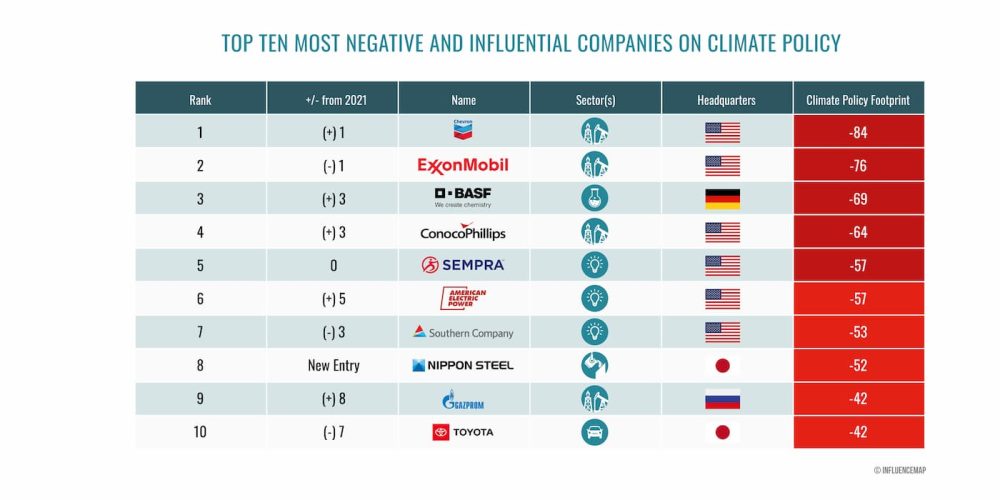
Toyota can’t seem to get out of its own way lately. The Japanese automaker ranked among the “world’s most obstructive companies on climate policy” of 2022, with oil giants like Exxon Mobile, Chevron, and leading Russian oil companies.
“Change is the law of life. And for those who look only to the past or present are certain to miss the future.” former US President John F. Kennedy once said.
The automobile industry and world are moving forward with or without Toyota. The world’s largest automaker denies the growing demand for zero-emission electric vehicles.
Toyota, a first mover in hybrid vehicles, is one of the few automakers still claiming the market for electric cars is not there. Jack Hollis, Executive Vice President of Sales at Toyota Motor North America, was recently quoted saying:
I don’t think the market is ready. I don’t think the infrastructure is ready. And even if you were ready to purchase one, and if you could afford it … (the price is) still too high … It took 25 years to get to less than 10% (market share) for hybrid … The consumer isn’t demanding (EVs) at that level. The consumer is not screaming, ‘30% or 40% by tomorrow.
Despite these comments, electric vehicles are rapidly gaining market share in all major auto markets. Buyers are more inclined than ever to purchase an EV, with over 50% of buyers looking for zero-emission options.
Most automakers are overwhelmed with demand for electric vehicles. Ford, BMW, GM, Volkswagen, Mercedes-Benz, and essentially any other vehicle maker you can think of are selling record amounts of EVs every quarter.
Regarding price, there are several options on the market, starting under $30,000 (Chevy Bolt EV/EUV, Nissan Leaf), with more coming to the market in 2023.
Toyota’s lack of climate efforts
In a recent study from Greenpeace, the non-profit organization found Toyota ranked last out of the top ten automakers in terms of decarbonization efforts. The study found Toyota:
- Generated less than 1% of total sales from zero-emission vehicles (not hybrids).
- Had the least developed supply chain for reducing carbon emissions.
Toyota has offered hybrids for over two decades, which has provided a means of transitioning to zero-emission, fully electric.
Despite this, Toyota is sticking to its hybrid strategy, offering hybrid, fuel-cell, and gas-powered vehicles, claiming:
Playing to win means playing with all the cards in the deck – not just a select few. So that’s our strategy and we’re sticking to it.
More recently, the world’s largest automaker has seemingly lightened up to the idea as EV sales continue climbing, as reports suggest an EV strategy overhaul may be in the works.
Toyota, big oil rank worst on climate policy
On a list dominated by the world’s largest oil and gas companies, Toyota ranked tenth on the “most negative and influential companies on climate policy” of 2022.

Ed Collins, InfluenceMap Director, states:
Many of the companies on the list have top-line commitments to addressing climate change, but continue to push back on specific policies designed to achieve that.
Toyota remains the most negative company regarding climate change in the transportation sector. Meanwhile, the study does note the Japanese automaker has “improved its climate policy engagement” but is still leading “global automotive lobbying efforts to oppose policies to phase out internal combustion engine-powered vehicles.”
BMW also made the list, placing 16, after leading advocacy efforts against the EU’s decision to ban combustion vehicle sales after 2035.
Electrek’s Take
Toyota set itself up for this. I don’t have a personal vendetta against Toyota, but the company continues to stand in the way of fully electric, zero-emission transportation.
Looking at past comments from Toyota’s executives, it’s as if they have something against pure EVs. Perhaps this could be due to the fact they grew to become the world’s largest automaker with their hybrid technology, and they don’t believe they should give it up.
Like John F. Kennedy said, “Change is the law of life,” and the transportation sector is transitioning under Toyota’s feet.
The world’s largest automaker has stepped up its EV investment efforts recently, but the company needs to show more, or it may certainly end up being the one to “miss the future.”
Subscribe to Electrek on YouTube for exclusive videos and subscribe to the podcast.
Author: Peter Johnson
Source: Electrek



